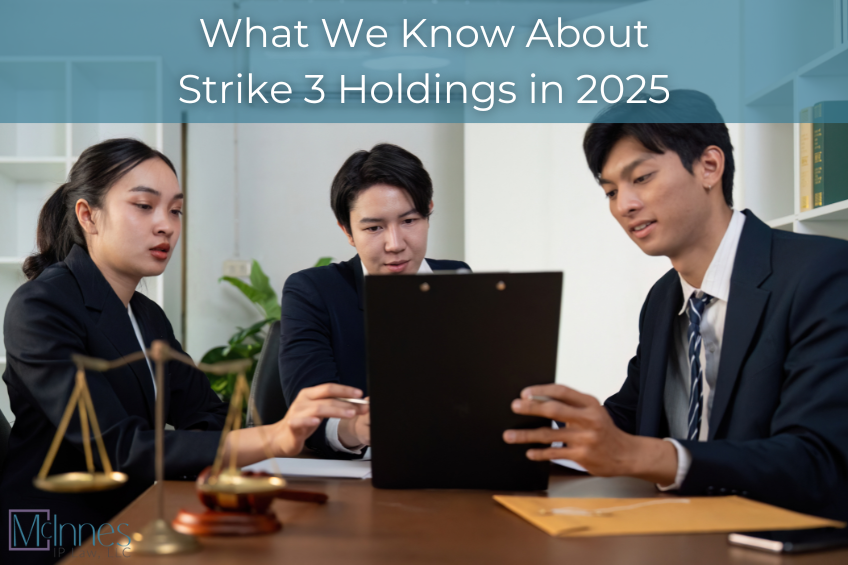Strike 3 Holdings, LLC has become one of the best-known names in a very specific corner of copyright litigation: mass lawsuits tied to adult films. Since about 2017, Strike 3 — the rights-holder behind brands such as Blacked, Tushy, Vixen and related studio labels — has pursued suspected copyright infringers who appear on peer-to-peer (BitTorrent) networks. Strike 3 Holdings has done so with a repeatable strategy that has made headlines and generated a steady stream of law-firm blog posts, defenses, and cautionary tales.
What We’ll Cover:
- How Strike 3 Holdings identifies targets
- What Strike 3 typically asks for
- Is Strike 3 a copyright troll?
- Threshold for pursuing subpoenas
- Common procedural steps in Strike 3 lawsuits
- Key takeaways
- Legal representation
How Strike 3 Holdings Identifies Targets
Strike 3’s cases typically begin with automated monitoring of BitTorrent swarms for specific titles. When Strike 3 detects an IP address sharing one of their movies, they log that IP address and associated time stamps. Rather than immediately initiating a “John Doe” complaint in federal court, Strike 3 waits until there are at least twenty-four downloads before filing suit and asking the court to issue a subpoena to the relevant Internet Service Provider (ISP) to force the disclosure of the subscriber’s name and address. The ISP then sends notice to the subscriber notifying them of the subpoena. The dreaded moment when the subscriber finds out they’ve been implicated.
What Strike 3 Typically Asks for and Why It Scares People
A copyright plaintiff can seek statutory damages that range very high (up to $150,000 per infringed work under the Copyright Act). However, in practice, Strike 3’s common approach in the John Doe phase is to seek the subscriber’s identity and then negotiate a settlement. Deposition testimony from a Strike 3 representative revealed that Strike 3 receives between $7.2 million and $9.6 million annually in settlement revenues.
In 2025, the average settlements seen in our firm tend to average around $7,000. In cases where the defendant can prove a financial hardship, the settlements often settle for much less. Every case is different, and the outcomes cannot be guaranteed. Because the initial process begins with anonymity (the John Doe stage), the combination of potential exposure and the administrative burden of litigation is what leads many recipients to consider settlement negotiations.
Is Strike 3 Really a “Copyright Troll”?
Critics call Strike 3 a “copyright troll” because their business model appears to rely heavily on large numbers of small, repeat claims, anonymity in the earliest phase, and settlement pressure rather than the selling of DVDs, which was once their main source of revenue. Many neutral observers point out that Strike 3 owns the copyrights and has a legal right to enforce them.
The controversy typically centers on tactics, proportionality, and accuracy of attribution (IP address ≠ proof of a particular person’s conduct). Many emphasize real risks of misidentification (open Wi-Fi, roommates, hacked routers, VPNs used incorrectly), which complicates the legal picture.
Do You Need Legal Representation Against Strike 3 Holdings?
Threshold for Pursuing Subpoenas: What the Record Shows
You may encounter a concrete-sounding claim online: that Strike 3 will not seek an ISP subpoena unless a given IP address has been involved in a large number of downloads — frequently quoted figures cluster around 20–35 different titles. It is our experience that a common median of around 24 titles must be met before Strike 3 issues a subpoena. In other words, Strike 3 generally targets IPs that show up multiple times/several different titles.
Common Procedural Steps Once Strike 3 Identifies an IP Address:
1) Strike 3 files the John Doe complaint and moves for limited discovery to obtain the subscriber info from the ISP.
2) The court usually allows the limited subpoena to proceed if the complaint plausibly alleges infringement. The ISP then notifies the subscriber, which triggers panic for many households.
3) If the subscriber becomes a named defendant, Strike 3’s counsel typically offers settlement options to avoid a public contested litigation. Otherwise, the case can proceed through discovery and trial.
Key Takeaways
If you receive a subpoena or a notice from your ISP, treat it seriously but don’t panic. Do not reach out to Strike 3 directly. Do not admit wrongdoing and consider consulting an experienced copyright/Internet defense attorney or firm such as McInnes IP Law, LLC.
Get Help Responding to a Strike 3 Holdings Subpoena
If you’re worried about exposure, understand the options. Some defendants successfully quash subpoenas or negotiate low settlements. Others end up paying to avoid litigation. The right move depends on the technical facts, your willingness to fight, and cost considerations.
If you need Strike 3 attorneys because of an ISP notice, call us at (774) 234-1256, email us at info@mcinnesiplaw.com, or message us on our LinkedIn Company Page.
Disclaimer: This post is for informational purposes only and does not constitute legal advice. Reading it does not create an attorney–client relationship. Every matter is fact-specific; consult counsel about your specific situation and jurisdiction.

